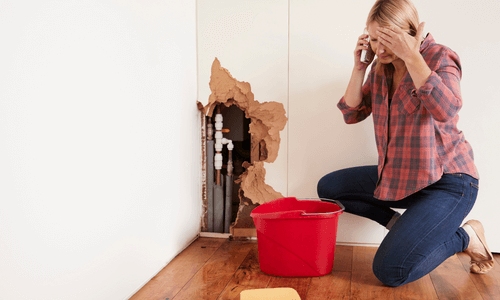
7 Reasons Why Your Water Pipes Burst
Water pipes burst can cause significant damage to homes, leading to costly repairs and disruptions to daily life. Understanding the reasons behind pipe bursts is essential for homeowners to prevent such incidents and maintain the integrity of their plumbing systems. In this comprehensive guide, Local Plumber, a trusted authority in Tampa, FL, will delve into the seven primary reasons why water pipes burst. From freezing temperatures to corrosion, we’ll explore each factor in detail and provide expert insights on how to mitigate the risks.1. Freezing Temperatures:
Freezing temperatures are one of the most common causes of bursting pipes, particularly in regions prone to cold weather. When water inside a pipe freezes, it undergoes a phase change from liquid to solid, expanding in volume by approximately 9%. This expansion exerts tremendous pressure on the walls of the pipe, which can lead to fractures, cracks, or complete rupture if the pressure exceeds the structural integrity of the pipe.Several factors contribute to the vulnerability of pipes to freezing temperatures. Pipes located in unheated or poorly insulated areas, such as exterior walls, attics, crawl spaces, or basements, are more susceptible to freezing. Additionally, pipes that are exposed to outdoor elements, such as outdoor hose bibs or irrigation lines, are at a higher risk of freezing.
The severity of freezing depends on several variables, including the duration and intensity of cold weather, the insulation and thickness of the pipe walls, and the flow rate of water inside the pipe. Prolonged exposure to below-freezing temperatures can cause even well-insulated pipes to freeze, especially if there is minimal water movement within the pipe.
Preventing bursting pipes due to freezing temperatures requires proactive measures to insulate and protect vulnerable pipes. Homeowners can:
- Insulate pipes in unheated areas using pipe insulation sleeves or heat tape.
- Seal gaps or cracks in walls, floors, or foundations to prevent cold air infiltration.
- Keep interior spaces adequately heated, especially during extreme cold spells.
- Allow faucets to drip slightly to keep water flowing and prevent freezing.
- Drain outdoor hoses and shut off outdoor water sources before winter.
2. Corrosion:
Corrosion is a gradual process that can weaken the metal pipes in a plumbing system over time, eventually leading to bursting. Various factors contribute to pipe corrosion, including chemical reactions between water and metal, high mineral content in water, and exposure to acidic substances. As corrosion progresses, it can cause the walls of the pipe to thin and weaken, making them more susceptible to failure under pressure.Corrosion-related bursting often occurs in older homes with aging plumbing infrastructure, particularly those with pipes made of materials such as galvanized steel or copper. Signs of corrosion in pipes may include discoloration, rust, or pinhole leaks.
To mitigate the risk of bursting pipes due to corrosion, homeowners should consider replacing older pipes with newer, corrosion-resistant materials such as copper or PEX. Additionally, installing water treatment systems to reduce mineral content and acidity in water can help prolong the lifespan of plumbing pipes and prevent corrosion-related issues. Regular inspections and maintenance by a licensed plumber are also essential for identifying and addressing corrosion before it leads to pipe failure.
Corrosion can be caused by various factors, including:
- Chemical reactions between water and metal.
- High mineral content in water.
- Exposure to acidic substances.
To mitigate corrosion-related pipe bursts, homeowners should:
- Regularly inspect pipes for signs of corrosion, such as discoloration or rust.
- Replace corroded pipes with newer, corrosion-resistant materials.
- Install water treatment systems to reduce mineral content and acidity in water.
3. Water Pressure Issues:
Water pressure issues, particularly excessive pressure, can strain pipes and increase the risk of bursting. High water pressure places undue stress on the walls of the pipes, especially in older or weakened sections of the plumbing system. Common causes of high water pressure include faulty pressure regulators, water hammer (sudden pressure surges), and municipal water supply issues.Excessive water pressure can lead to several problems, including pipe leaks, bursts, and damage to fixtures and appliances. When water pressure exceeds the recommended levels (typically 40-80 psi), it can cause pipes to expand beyond their capacity, leading to fractures or ruptures.
To address water pressure-related risks, homeowners should consider installing a pressure regulator to maintain safe water pressure levels throughout the plumbing system. Additionally, water hammer arrestors can help absorb pressure surges and prevent sudden spikes in pressure. Regular monitoring of water pressure and prompt repairs of any issues can help prevent bursts and ensure the longevity of the plumbing infrastructure.
Common causes of high water pressure include:
- Faulty pressure regulators.
- Water hammer (sudden pressure surges).
- Municipal water supply issues.
To address water pressure-related risks, homeowners should:
- Install a pressure regulator to maintain safe water pressure levels.
- Install water hammer arrestors to absorb pressure surges.
- Monitor water pressure regularly and address any fluctuations promptly.
4. Age of Pipes:
The age of pipes is a significant factor contributing to the risk of bursting within a plumbing system. Over time, pipes undergo wear and tear, leading to deterioration of their structural integrity. Older homes often have plumbing systems constructed with materials such as galvanized steel, iron, or polybutylene, which are prone to corrosion, rust, and weakening over time.As pipes age, they become more susceptible to various forms of damage, including corrosion, erosion, and material fatigue. This degradation can result in weakened pipe walls, making them more prone to bursts, leaks, and failures under pressure. Additionally, older pipes may develop cracks, fractures, or joint failures due to prolonged use and exposure to environmental factors.
To mitigate the risk of bursting pipes due to age, homeowners should consider replacing aging pipes with newer, more durable materials such as copper, PVC, or PEX. Regular inspections and maintenance by a qualified plumber are also essential for identifying signs of deterioration and addressing potential issues before they escalate into bursts or leaks. By investing in modern plumbing materials and proactive maintenance, homeowners can ensure the longevity and reliability of their plumbing systems for years to come.
5. Physical Damage:
Physical damage to pipes is a common cause of bursts, resulting from various factors such as construction work, tree root intrusion, or accidental damage during renovations. Even minor impacts or stresses on a pipe can compromise its structural integrity, leading to leaks, fractures, or complete ruptures.Construction activities near plumbing lines, such as excavation, drilling, or digging, can inadvertently damage pipes, especially if they are not properly marked or protected. Similarly, tree roots can infiltrate underground pipes, exerting pressure on the walls and causing cracks or breaks. Additionally, accidental damage from DIY projects or renovations, such as drilling into walls or hammering nails, can puncture pipes and lead to bursts.
To prevent physical damage-related pipe bursts, homeowners should exercise caution when conducting activities near plumbing lines and avoid planting trees or shrubs near underground pipes. Regular inspections of pipes for signs of damage, such as dents, cracks, or leaks, can help identify issues early and prevent catastrophic failures. When undertaking construction or renovation projects, homeowners should consult with a qualified plumber to ensure the safety and integrity of their plumbing system.
To prevent physical damage-related pipe bursts, homeowners should:
- Exercise caution when conducting home improvement projects near plumbing lines.
- Avoid planting trees or shrubs near underground pipes.
- Inspect pipes regularly for signs of damage and address any issues promptly.
6. Clogs and Blockages:
Clogs and blockages in plumbing pipes can lead to bursting if left unaddressed. When debris, such as hair, grease, food particles, or mineral deposits from hard water, accumulate inside a pipe, they restrict water flow and increase pressure within the pipe. Over time, this elevated pressure can weaken the pipe walls, causing them to burst.Common causes of clogs and blockages include improper disposal of waste, flushing non-biodegradable items down drains, and mineral buildup from hard water. Additionally, tree roots infiltrating sewer lines can obstruct pipes and exacerbate blockages.
To prevent clogs and blockages from causing bursts, homeowners should adopt proactive measures such as disposing of waste properly, using drain guards or strainers to catch debris, and scheduling regular drain cleaning and maintenance. Professional drain cleaning services can remove stubborn blockages and buildup, restoring proper water flow and relieving pressure on the pipes. By addressing clogs and blockages promptly, homeowners can mitigate the risk of bursting pipes and avoid costly damage to their plumbing system and property.
Common causes of clogs include:
- Accumulated debris, such as hair, grease, or food particles.
- Mineral deposits from hard water.
- Tree roots infiltrating sewer lines.
To prevent clogs and blockages, homeowners should:
- Dispose of waste properly and avoid flushing non-biodegradable items down drains.
- Use drain guards or strainers to catch debris.
- Schedule regular drain cleaning and maintenance to remove buildup and prevent blockages.
7. Poor Installation:
Poor installation of plumbing pipes can contribute to bursting due to various factors that compromise the integrity of the system. Improperly sized or joined pipes, inadequate support, and incorrect sealing or insulation can all lead to vulnerabilities that increase the risk of bursts.Inadequate support for pipes can cause sagging or stress, leading to structural weaknesses and potential failures under pressure. Improper sizing or joining of pipes can create weak points where leaks or bursts are more likely to occur, especially at joints or connections. Additionally, improper sealing or insulation of joints can allow water to escape or freeze, further exacerbating the risk of bursting.
To prevent burst pipes due to poor installation, homeowners should ensure that plumbing work is performed by licensed, experienced professionals who adhere to industry standards and best practices. Thorough inspections of newly installed pipes can help identify and address any issues before they lead to failures. By investing in quality installation and ongoing maintenance, homeowners can minimize the risk of bursting pipes and protect their plumbing system and property from damage.
To avoid burst pipes due to poor installation, homeowners should:
- Hire licensed, experienced plumbers for new installations or renovations.
- Ensure pipes are properly supported, secured, and insulated.
- Conduct thorough inspections of newly installed pipes to identify and address any issues.
Understanding the reasons behind water pipes burst is crucial for homeowners to protect their properties and prevent costly damage. By addressing issues such as freezing temperatures, corrosion, water pressure problems, aging pipes, physical damage, clogs, and poor installation, homeowners can safeguard their plumbing systems and enjoy peace of mind. For expert assistance with pipe maintenance, repairs, or replacements, homeowners in Tampa, FL, can rely on the expertise of professionals at Local Plumber. With proactive measures and professional guidance, homeowners can minimize the risks of Water Pipes Burst and maintain the integrity of their plumbing infrastructure for years to come.
Contact us today for any plumbing issues and we shall be at your service. Email us at services@local-plumber.com or call us at 813-776-7667 (POOP).





Leave a comment